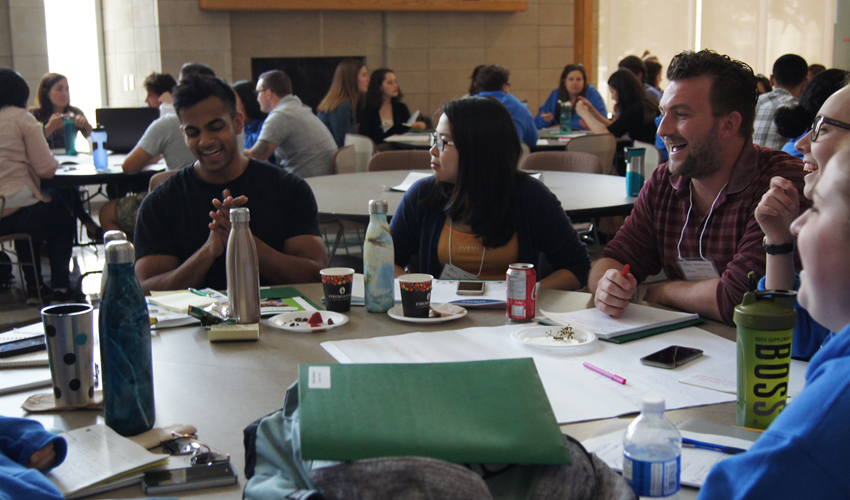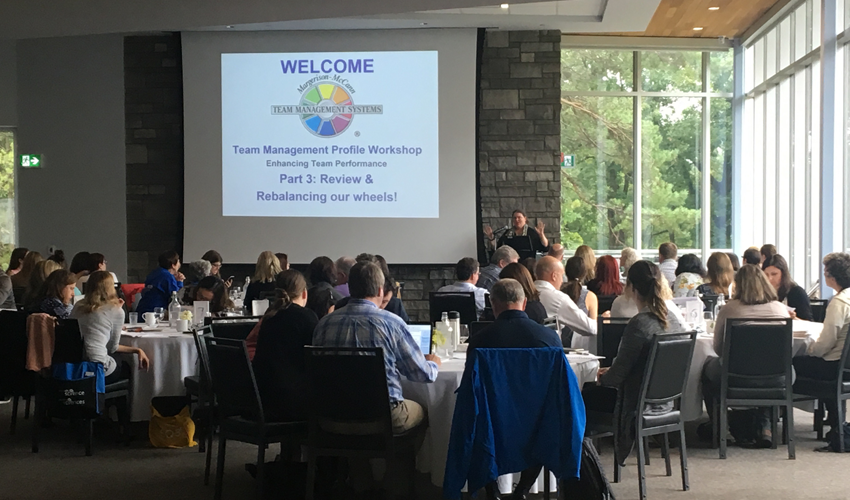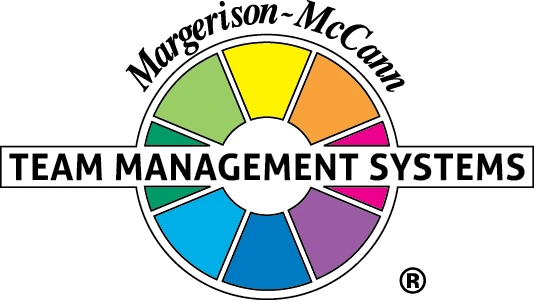
Applying Science at Let's Talk Science
Isabel Deslauriers is an evangelist - both for science and for the Margerison-McCann Team Management Profile (TMP). She's managed to combine the two in her role as Director of Youth and Volunteer Experience at Let's Talk Science, a leading not-for-profit organization in the science education and outreach sector in Canada.
Isabel is responsible for developing and delivering programs that engage young people and volunteers in activities and experiences designed to increase their interest in, and awareness of, science, and prepare young people not only for Science, Technology, Engineering and Math (STEM) based careers but also to be citizens in our increasingly STEM-infused society. Key to promoting the message and running the programs is a network of around 4,000 volunteers who deliver science outreach activities to over 300,000 young people every year, free of charge.
The volunteers are 'managed' by local site coordinators at 50 university and college partner sites across Canada. Let's Talk Science's national staff team of around 75 people provides leadership and support to these volunteer coordinators, who in turn support the volunteers: professional development is at the heart of this support, and the Team Management Profile is a lynchpin.
Isabel has been a fan of the TMP for a long time. She explains: "My first interaction with the TMP came in 2005 when I was studying [electrical engineering] at McGill University. I was already a volunteer site co-ordinator with Let's Talk Science and had been invited to do a professional development session at the national conference. That had a really big impact on me: I was just starting to think about the kind of career I wanted to pursue, and the TMP taught me a lot about myself that I was able to immediately put into practice in my everyday life and as a volunteer coordinator. When I started to work for Let's Talk Science ten years ago I wanted the volunteers and the rest of the staff to gain the same benefits I did. I became accredited, and from then on the TMP was an integral part of the regular professional development workshops that we ran for staff and volunteers."
Offering this kind of professional development to young people, including volunteers, is highly valuable, points out Isabel. "It really helped focus my thoughts about what I wanted to do in my early career," she says. "And we think it’s really beneficial for our volunteer coordinators, many of whom are students: they volunteer out of the goodness of their hearts, because they believe in the 'mission', and the TMP is something of real value that we can give them, in recognition of their efforts, to help them when they embark on their careers. What they learn from the TMP is very complementary to what they get out of their formal education."
Sustainability at the Core
And the benefits of the TMP are enduring. "It's not a 'one-hit wonder'," she says. "I have done so many courses where you do it once, get excited about it, and then life goes on and it kind of tapers off. Using the TMP organization-wide is an approach that has sustainability at its core, because it gives you a shared vocabulary and a common framework, and we build on that by constantly refreshing and reinforcing it." Volunteers complete the TMP every three years at the national conference, even if they've done it before, and staff have been doing it every two years.
Self-awareness is the most immediate benefit. "I can remember the first time I read my Profile, back in 2005, and thinking, 'wow, have you been spying on me?'," recalls Isabel. "Everything in there was so accurate, but I couldn't have necessarily articulated it myself." It was also 'revelatory': "For example, the Profile highlighted my tendency to develop a very detailed plan in isolation, present it as a 'perfect idea' and then be surprised that other people didn't immediately buy into it. The analysis around that was my first realization that everyone thinks in different ways - which is a really useful insight to gain when you are relatively young."
Glenda Casimir, now Manager of Insights at Let's Talk Science, used to be Isabel's manager. She recalls the passion with which Isabel 'sold' the TMP to the president of Let's Talk Science as a tool that would help not just individuals but also the organization as a whole. "I also remember when Isabel and I first shared our Profiles with each other. It really opened our eyes and challenged our assumptions that everyone liked to work the way we did. Even Isabel and I have very different work preferences, and I felt very guilty when I realized what I had been putting her through. For example, I used to brainstorm as we went along, but that used to put her and others on the spot, because they needed time to reflect on ideas. That realization really shifted our thinking about how to interact with each other."
Isabel made similar discoveries. "What I took away from this process was that Glenda benefited from being able to talk through her ideas with others, and that I needed to give her space to do so, without expecting everything to come out as a fully-formed thought. I think this is what I like best about the TMP - how it helps people respect and support each other's differing approaches."
Such insights facilitate more effective team working across groups of volunteers. Isabel and her colleagues help volunteer co-ordinators to share their Profiles with their teams, to explain that different behaviours are neither 'right' nor 'wrong' but rather a reflection of preferred working styles and that respecting these different preferences is essential to good teamworking. But this 'classroom' work is reinforced in staff and volunteers' everyday work through the supporting material provided by TMS Americas, including the Team Working Wheel (or 'Types of Work Model') and Team Working Wheel workbook. The Team Working Wheel reflects the TMP work preferences: for example, Explorer Promoter equates to 'Promoting', Thruster Organizer equates to 'Organizing', and so on. It's a deceptively simple model that allows teams to ensure that any project, plan, problem or meeting is addressed comprehensively, and is reinforced by the 'Linking Skills' needed to progress from one Type of Work function to the next.
"We label each step of the discussion according to different areas of the Wheel, so that at every stage everyone is in the appropriate mindset - 'Innovating', 'Promoting' and so on," says Isabel. "It's very useful: for example, during an Innovating discussion, for someone like me, who's a Thruster Organizer, my brain doesn't immediately go into the 'is this feasible, what resources do we need, who'll do the work, when will it happen?' mode, because I know that we'll get to that two steps along. That makes me feel much more comfortable about how the discussion is going."
The tools are particularly valuable when teams are virtual, as many of them are in Let's Talk Science, which Isabel describes as "a largely virtual organization." She explains: "It can be challenging to run virtual teams because you miss all the non-verbal cues that you get in face-to-face meetings. The common framework and language the TMP offers really helps compensate for that."

An aid to recruitment and onboarding
So ingrained is the TMP in how Let's Talk Science staff and volunteers think and work, that some at Let's Talk Science even use it to help recruit, interview and onboard new staff and volunteers - with the important caveat that everyone remembers that the TMP is about preferences rather than skills, as Isabel explains.
"When you're figuring out a new position, you will naturally think about the eight areas of work and whether they get covered off in the team. TMPs give part of the story, but you have to remember that people have also acquired, to various degrees, proficiency for working in non-favourite areas of work. So the gaps as far as which areas of work get covered or not may not match exactly with what the gaps are if you simply superimpose all the team's TMPs. For example, maybe no-one on my team has an 'Inspecting' preference, but we deal with that effectively by having a process in place to make sure that 'Inspecting' work happens, or another team that works very closely with us takes on that role and is very well integrated with us. Conversely, we may have someone with a 'Promoting' preference, but we have so much 'Promoting' work to do that one person isn't enough."
What's more, continues Isabel, if you're adding a new person to the team, and existing members of the team have the opportunity to pass on work to them, it makes sense to use what you know about your team's TMPs to initiate discussions about what aspects of their work it makes sense to pass on. "For example, if you know someone has been doing a lot of Promoting work even though it's not her preference, ask her if she is enjoying the challenge and sees it as an opportunity for growth, or, actually, it is making her work feel like a grind."
Yet she warns about scoping out a new role that is "a sort of grab bag for all the work that's not currently getting done," and advises instead designing a role that focuses around just a few types of work, which is likely to appeal to certain individuals who really thrive in such a role.
At the interview stage, devoting a significant part of the interview to work style pays dividends, she continues, suggesting that employers could structure the interview around the four measures of work preference - ie, extrovert - introvert, practical - creative, analytical - beliefs and structured - flexible. "For example, maybe you work in an environment where there will be a lot of interruptions and last-minute changes, which someone with a 'flexible' work preference will find easier to deal with than a 'structured' person. But remember that work preferences are preferences, not proficiency. So ask questions that focus on behaviours - like 'what would you do if somebody interrupted you in the middle of a task that required concentration?'. Their preferences will come through in their answer, but you are giving them a chance to speak about how they have learned to cope in situations that don't cater to their preferences, and you can evaluate how proficient they are at that acquired skill."
When onboarding new recruits it's useful to run team workshops comprising people who've never done the TMP before and those who are familiar with it. "But we always go round the workshop and get everyone to share something from their Profile that they want others to know so that they can work effectively with them. It provides a safe space to tell your colleagues something important about you, and that's a really valuable aspect of onboarding - though in most organizations it rarely happens."
Recently, for example, a new member of her own team chose to share that she doesn't always speak up in meetings, but only because she needs to think about things, not because she is disengaged. "She would never have told people that otherwise, and people might just have labelled her as 'quiet'. We now know that we need to get her contribution in a different way, and she feels less self-conscious and is comfortable that people are not assigning meanings to her behaviour based on assumptions. That understanding helps to sustain a positive team culture right from the moment someone joins."
The TMP work allows teams at Let's Talk Science to harness their collective and complementary strengths, which benefits the organization itself and, notes Isabel, "sends a signal that there is an expectation for staff to take time to understand each other's working preferences and respect them."

The Staff Member
Deirdre Crilly joined the fundraising department in Let's Talk Science just over two years ago and did the TMP two years later. A graduate in Chemistry and Ecology, she'd done other psychometric tests in previous volunteering roles, but found the TMP more helpful than anything she'd done before. For one, it taught her more about herself. "I'd seen other people's Profiles and could see how their preferences matched their roles and work styles, and based on that I thought I would come out as a Thruster-Organizer. I did, but what surprised me was how strong I was on the 'practical' and 'analytical' spectrums of Work Preference measures. I knew I liked structure, but I was a lot less flexible than I thought I was."
She found the TMP more useful than other tools, which focus on more general characteristics, because of its immediate utility in the work setting. "And because you can map everyone on the Wheel it is very easy to see where you have gaps and overlap."
When she first did the TMP with her team, there were gaps. "We talked about whether we needed to fill every single role and decided we didn't. There were nine of us and we were mainly on the Assessor-Developer, Thruster-Organizer, Concluder-Producer and Controller-Inspector side of the Wheel, which is what you might expect from a group of support staff, which is what we mostly are. The external facing people were - again, possibly predictably - Explorer-Promoters and Creator-Innovators. We were short on Upholder-Maintainers and Reporter-Advisers, but decided we had plenty of those in the Finance team, so didn't need to cover those ourselves."
Just as valuable as the Profiles themselves were the practical exercises designed to show people where they fall on the Work Preferences continuum. "Actually seeing where people are when the whole organization lined up was fascinating, and extremely helpful for me in my role, because I have to deal with so many of them as a sort of virtual team. Seeing their characteristics demonstrated in that very visual way explained a lot of the conflicts that we'd been having between, for example, beliefs-oriented and analytical people, and has helped me to adjust how I interact with them."
And this adjustment has been underpinned by the TMS Americas supporting material, from the Types of Work Model, to Pacing tips (the typical characteristics of people with different preferences) to Linking skills (tips on how certain types of people could work more effectively with different types of people). "Bearing in mind everyone's top five 'peeves' and top five preferences really helps you find a middle ground when interacting with them," says Deirdre.
This summer she and Isabel are planning to run a special workshop for her fundraising team, which has changed significantly over the past year. "I have lots of new staff, including several 'big' personalities who have very strong views and beliefs and like expressing them," she says. "Our meetings and interactions don't work as well as they might, and the fact that we are not co-located exacerbates that."
The plan is to get everyone together in one place, go through their Profiles together and encourage everyone to come up with one or two ways they can improve the way they work. And that doesn't just mean finding ways to reduce conflict: "I am so similar to someone in the team that there is a danger of group think."
The 'longer game', says Deirdre, is to look at how people's Profiles relate to Let's Talk Science's core values, mission and culture. "We are doing a lot of work on organizational culture at the moment, and the way we use the TMP ties into that. It's quite interesting: when people express their views about the kind of culture we have here, or should have, the practical and analytical ones talk in terms of 'accountability' and the extroverts and creative types emphasise the 'learning culture'."
Copyright © TMS Americas - Authorized distributor of Margerison-McCann Team Management Systems in North, Central and South Amerian Regions.

